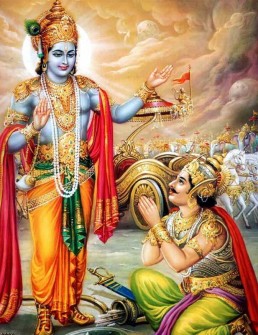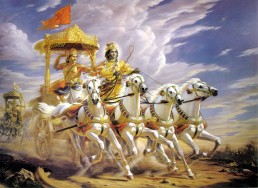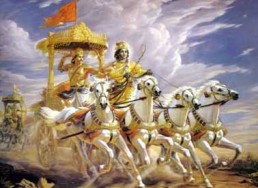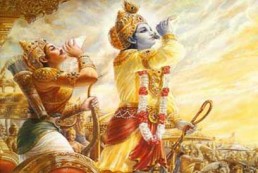Bhagavad Gita-Chapter 2 All Verses with Meaning and Audio
तं तथा कृपयाविष्टमश्रुपूर्णाकुलेक्षणम् ।
विषीदन्तमिदं वाक्यमुवाच मधुसूदनः ॥ २-१॥
taṃ tathā kṛpayāviṣṭam aśrupūrṇākulekṣaṇam
viṣīdantamidaṃ vākyamuvāca madhusūdanaḥ 2-1
कुतस्त्वा कश्मलमिदं विषमे समुपस्थितम् ।
अनार्यजुष्टमस्वर्ग्यमकीर्तिकरमर्जुन ॥ २-२॥
kutastvā kaśmalamidaṃ viṣame samupasthitam
anāryajuṣṭamasvargyamakīrtikaramarjuna 2-2
क्षुद्रं हृदयदौर्बल्यं त्यक्त्वोत्तिष्ठ परन्तप ॥ २-३॥
kṣudraṃ hṛdayadaurbalyaṃ tyaktvottiṣṭha parantapa 2-3
कथं भीष्ममहं सङ्ख्ये द्रोणं च मधुसूदन ।
इषुभिः प्रतियोत्स्यामि पूजार्हावरिसूदन ॥ २-४॥
kathaṃ bhīṣmamahaṃ saṅkhye droṇaṃ ca madhusūdana
iṣubhiḥ pratiyotsyāmi pūjārhāvarisūdana 2-4
श्रेयो भोक्तुं भैक्ष्यमपीह लोके ।
हत्वार्थकामांस्तु गुरूनिहैव
भुञ्जीय भोगान् रुधिरप्रदिग्धान् ॥ २-५॥
śreyo bhoktuṃ bhaikṣyamapīha loke
hatvārthakāmāṃstu gurūnihaiva
bhuñjīya bhogān rudhirapradigdhān 2-5
यद्वा जयेम यदि वा नो जयेयुः ।
यानेव हत्वा न जिजीविषाम-
स्तेऽवस्थिताः प्रमुखे धार्तराष्ट्राः ॥ २-६॥
yadvā jayema yadi vā no jayeyuḥ
yāneva hatvā na jijīviṣāma-
ste’vasthitāḥ pramukhe dhārtarāṣṭrāḥ 2-6
पृच्छामि त्वां धर्मसम्मूढचेताः ।
यच्छ्रेयः स्यान्निश्चितं ब्रूहि तन्मे
शिष्यस्तेऽहं शाधि मां त्वां प्रपन्नम् ॥ २-७॥
pṛcchāmi tvāṃ dharmasammūḍhacetāḥ
yacchreyaḥ syānniścitaṃ brūhi tanme
śiṣyaste’haṃ śādhi māṃ tvāṃ prapannam 2-7
यच्छोकमुच्छोषणमिन्द्रियाणाम् ।
अवाप्य भूमावसपत्नमृद्धं
राज्यं सुराणामपि चाधिपत्यम् ॥ २-८॥
yacchokamucchoṣaṇamindriyāṇām
avāpya bhūmāvasapatnamṛddhaṃ
rājyaṃ surāṇāmapi cādhipatyam 2-8
एवमुक्त्वा हृषीकेशं गुडाकेशः परन्तप ।
न योत्स्य इति गोविन्दमुक्त्वा तूष्णीं बभूव ह ॥ २-९॥
evamuktvā hṛṣīkeśaṃ guḍākeśaḥ parantapa
na yotsya iti govindamuktvā tūṣṇīṃ babhūva ha 2-9
सेनयोरुभयोर्मध्ये विषीदन्तमिदं वचः ॥ २-१०॥
senayorubhayormadhye viṣīdantamidaṃ vacaḥ 2-10
अशोच्यानन्वशोचस्त्वं प्रज्ञावादांश्च भाषसे ।
गतासूनगतासूंश्च नानुशोचन्ति पण्डिताः ॥ २-११॥
aśocyānanvaśocastvaṃ prajñāvādāṃśca bhāṣase
gatāsūnagatāsūṃśca nānuśocanti paṇḍitāḥ 2-11
न चैव न भविष्यामः सर्वे वयमतः परम् ॥ २-१२॥
na caiva na bhaviṣyāmaḥ sarve vayamataḥ param 2-12
तथा देहान्तरप्राप्ति र्धीरस्तत्र न मुह्यति ॥ २-१३॥
tathā dehāntaraprāptir dhīrastatra na muhyati 2-13
आगमापायिनोऽनित्या स्तांस्तितिक्षस्व भारत ॥ २-१४॥
āgamāpāyino’nityā stāṃstitikṣasva bhārata 2-14
समदुःखसुखं धीरं सोऽमृतत्वाय कल्पते ॥ २-१५॥
samaduḥkhasukhaṃ dhīraṃ so’mṛtatvāya kalpate 2-15
उभयोरपि दृष्टोऽन्त स्त्वनयोस्तत्त्वदर्शिभिः ॥ २-१६॥
ubhayorapi dṛṣṭo’ntas tvanayostattvadarśibhiḥ 2-16
विनाशमव्ययस्यास्य न कश्चित्कर्तुमर्हति ॥ २-१७॥
vināśamavyayasyāsya na kaścitkartumarhati 2-17
अनाशिनोऽप्रमेयस्य तस्माद्युध्यस्व भारत ॥ २-१८॥
anāśino’prameyasya tasmādyudhyasva bhārata 2-18
उभौ तौ न विजानीतो नायं हन्ति न हन्यते ॥ २-१९॥
ubhau tau na vijānīto nāyaṃ hanti na hanyate 2-19
नायं भूत्वा भविता वा न भूयः ।
अजो नित्यः शाश्वतोऽयं पुराणो
न हन्यते हन्यमाने शरीरे ॥ २-२०॥
nāyaṃ bhūtvā bhavitā vā na bhūyaḥ
ajo nityaḥ śāśvato’yaṃ purāṇo
na hanyate hanyamāne śarīre 2-20
कथं स पुरुषः पार्थ कं घातयति हन्ति कम् ॥ २-२१॥
kathaṃ sa puruṣaḥ pārtha kaṃ ghātayati hanti kam 2-21
नवानि गृह्णाति नरोऽपराणि ।
तथा शरीराणि विहाय जीर्णा-
न्यन्यानि संयाति नवानि देही ॥ २-२२॥
navāni gṛhṇāti naro’parāṇi
tathā śarīrāṇi vihāya jīrṇā-
nyanyāni saṃyāti navāni dehī 2-22
न चैनं क्लेदयन्त्यापो न शोषयति मारुतः ॥ २-२३॥
na cainaṃ kledayantyāpo na śoṣayati mārutaḥ 2-23
नित्यः सर्वगतः स्थाणुरचलोऽयं सनातनः ॥ २-२४॥
nityaḥ sarvagataḥ sthāṇuracalo’yaṃ sanātanaḥ 2-24
तस्मादेवं विदित्वैनं नानुशोचितुमर्हसि ॥ २-२५॥
tasmādevaṃ viditvainaṃ nānuśocitumarhasi 2-25
तथापि त्वं महाबाहो नैवं शोचितुमर्हसि ॥ २-२६॥
tathāpi tvaṃ mahābāho naivaṃ śocitumarhasi 2-26
तस्मादपरिहार्येऽर्थे न त्वं शोचितुमर्हसि ॥ २-२७॥
tasmādaparihārye’rthe na tvaṃ śocitumarhasi 2-27
अव्यक्तनिधनान्येव तत्र का परिदेवना ॥ २-२८॥
avyaktanidhanānyeva tatra kā paridevanā 2-28
माश्चर्यवद्वदति तथैव चान्यः ।
आश्चर्यवच्चैनमन्यः शृणोति
श्रुत्वाप्येनं वेद न चैव कश्चित् ॥ २-२९॥
māścaryavadvadati tathaiva cānyaḥ
āścaryavaccainamanyaḥ śṛṇoti
śrutvāpyenaṃ veda na caiva kaścit 2-29
तस्मात्सर्वाणि भूतानि न त्वं शोचितुमर्हसि ॥ २-३०॥
tasmātsarvāṇi bhūtāni na tvaṃ śocitumarhasi 2-30
धर्म्याद्धि युद्धाच्छ्रेयोऽन्यत्क्षत्रियस्य न विद्यते ॥ २-३१॥
dharmyāddhi yuddhācchreyo’nyatkṣatriyasya na vidyate 2-31
सुखिनः क्षत्रियाः पार्थ लभन्ते युद्धमीदृशम् ॥ २-३२॥
sukhinaḥ kṣatriyāḥ pārtha labhante yuddhamīdṛśam 2-32
ततः स्वधर्मं कीर्तिं च हित्वा पापमवाप्स्यसि ॥ २-३३॥
tataḥ svadharmaṃ kīrtiṃ ca hitvā pāpamavāpsyasi 2-33
सम्भावितस्य चाकीर्तिर्मरणादतिरिच्यते ॥ २-३४॥
sambhāvitasya cākīrtirmaraṇādatiricyate 2-34
येषां च त्वं बहुमतो भूत्वा यास्यसि लाघवम् ॥ २-३५॥
yeṣāṃ ca tvaṃ bahumato bhūtvā yāsyasi lāghavam 2-35
निन्दन्तस्तव सामर्थ्यं ततो दुःखतरं नु किम् ॥ २-३६॥
nindantastava sāmarthyaṃ tato duḥkhataraṃ nu kim 2-36
तस्मादुत्तिष्ठ कौन्तेय युद्धाय कृतनिश्चयः ॥ २-३७॥
tasmāduttiṣṭha kaunteya yuddhāya kṛtaniścayaḥ 2-37
ततो युद्धाय युज्यस्व नैवं पापमवाप्स्यसि ॥ २-३८॥
tato yuddhāya yujyasva naivaṃ pāpamavāpsyasi 2-38
बुद्ध्या युक्तो यया पार्थ कर्मबन्धं प्रहास्यसि ॥ २-३९॥
buddhyā yukto yayā pārtha karmabandhaṃ prahāsyasi 2-39
स्वल्पमप्यस्य धर्मस्य त्रायते महतो भयात् ॥ २-४०॥
svalpamapyasya dharmasya trāyate mahato bhayāt 2-40
बहुशाखा ह्यनन्ताश्च बुद्धयोऽव्यवसायिनाम् ॥ २-४१॥
bahuśākhā hyanantāśca buddhayo’vyavasāyinām 2-41
वेदवादरताः पार्थ नान्यदस्तीति वादिनः ॥ २-४२॥
vedavādaratāḥ pārtha nānyadastīti vādinaḥ 2-42
क्रियाविशेषबहुलां भोगैश्वर्यगतिं प्रति ॥ २-४३॥
kriyāviśeṣabahulāṃ bhogaiśvaryagatiṃ prati 2-43
व्यवसायात्मिका बुद्धिः समाधौ न विधीयते ॥ २-४४॥
vyavasāyātmikā buddhiḥ samādhau na vidhīyate 2-44
निर्द्वन्द्वो नित्यसत्त्वस्थो निर्योगक्षेम आत्मवान् ॥ २-४५॥
nirdvandvo nityasattvastho niryogakṣema ātmavān 2-45
तावान्सर्वेषु वेदेषु ब्राह्मणस्य विजानतः ॥ २-४६॥
tāvānsarveṣu vedeṣu brāhmaṇasya vijānataḥ 2-46
मा कर्मफलहेतुर्भूर्मा ते सङ्गोऽस्त्वकर्मणि ॥ २-४७॥
mā karmaphalaheturbhūrmā te saṅgo’stvakarmaṇi 2-47
सिद्ध्यसिद्ध्योः समो भूत्वा समत्वं योग उच्यते ॥ २-४८॥
siddhyasiddhyoḥ samo bhūtvā samatvaṃ yoga ucyate 2-48
बुद्धौ शरणमन्विच्छ कृपणाः फलहेतवः ॥ २-४९॥
buddhau śaraṇamanviccha kṛpaṇāḥ phalahetavaḥ 2-49
तस्माद्योगाय युज्यस्व योगः कर्मसु कौशलम् ॥ २-५०॥
tasmādyogāya yujyasva yogaḥ karmasu kauśalam 2-50
जन्मबन्धविनिर्मुक्ताः पदं गच्छन्त्यनामयम् ॥ २-५१॥
janmabandhavinirmuktāḥ padaṃ gacchantyanāmayam 2-51
तदा गन्तासि निर्वेदं श्रोतव्यस्य श्रुतस्य च ॥ २-५२॥
tadā gantāsi nirvedaṃ śrotavyasya śrutasya ca 2-52
समाधावचला बुद्धिस्तदा योगमवाप्स्यसि ॥ २-५३॥
samādhāvacalā buddhistadā yogamavāpsyasi 2-53
स्थितप्रज्ञस्य का भाषा समाधिस्थस्य केशव ।
स्थितधीः किं प्रभाषेत किमासीत व्रजेत किम् ॥ २-५४॥
sthitaprajñasya kā bhāṣā samādhisthasya keśava
sthitadhīḥ kiṃ prabhāṣeta kimāsīta vrajeta kim 2-54
प्रजहाति यदा कामान्सर्वान्पार्थ मनोगतान् ।
आत्मन्येवात्मना तुष्टः स्थितप्रज्ञस्तदोच्यते ॥ २-५५॥
prajahāti yadā kāmānsarvānpārtha manogatān
ātmanyevātmanā tuṣṭaḥ sthitaprajñastadocyate 2-55
वीतरागभयक्रोधः स्थितधीर्मुनिरुच्यते ॥ २-५६॥
vītarāgabhayakrodhaḥ sthitadhīrmunirucyate 2-56
नाभिनन्दति न द्वेष्टि तस्य प्रज्ञा प्रतिष्ठिता ॥ २-५७॥
nābhinandati na dveṣṭi tasya prajñā pratiṣṭhitā 2-57
इन्द्रियाणीन्द्रियार्थेभ्यस्तस्य प्रज्ञा प्रतिष्ठिता ॥ २-५८॥
indriyāṇīndriyārthebhyastasya prajñā pratiṣṭhitā 2-58
रसवर्जं रसोऽप्यस्य परं दृष्ट्वा निवर्तते ॥ २-५९॥
rasavarjaṃ raso’pyasya paraṃ dṛṣṭvā nivartate 2-59
इन्द्रियाणि प्रमाथीनि हरन्ति प्रसभं मनः ॥ २-६०॥
indriyāṇi pramāthīni haranti prasabhaṃ manaḥ 2-60
वशे हि यस्येन्द्रियाणि तस्य प्रज्ञा प्रतिष्ठिता ॥ २-६१॥
vaśe hi yasyendriyāṇi tasya prajñā pratiṣṭhitā 2-61
सङ्गात्सञ्जायते कामः कामात्क्रोधोऽभिजायते ॥ २-६२॥
saṅgātsañjāyate kāmaḥ kāmātkrodho’bhijāyate 2-62
स्मृतिभ्रंशाद् बुद्धिनाशो बुद्धिनाशात्प्रणश्यति ॥ २-६३॥
smṛtibhraṃśād buddhināśo buddhināśātpraṇaśyati 2-63
आत्मवश्यैर्विधेयात्मा प्रसादमधिगच्छति ॥ २-६४॥
ātmavaśyairvidheyātmā prasādamadhigacchati 2-64
प्रसन्नचेतसो ह्याशु बुद्धिः पर्यवतिष्ठते ॥ २-६५॥
prasannacetaso hyāśu buddhiḥ paryavatiṣṭhate 2-65
न चाभावयतः शान्तिरशान्तस्य कुतः सुखम् ॥ २-६६॥
na cābhāvayataḥ śāntiraśāntasya kutaḥ sukham 2-66
तदस्य हरति प्रज्ञां वायुर्नावमिवाम्भसि ॥ २-६७॥
tadasya harati prajñāṃ vāyurnāvamivāmbhasi 2-67
इन्द्रियाणीन्द्रियार्थेभ्यस्तस्य प्रज्ञा प्रतिष्ठिता ॥ २-६८॥
indriyāṇīndriyārthebhyastasya prajñā pratiṣṭhitā 2-68
यस्यां जाग्रति भूतानि सा निशा पश्यतो मुनेः ॥ २-६९॥
yasyāṃ jāgrati bhūtāni sā niśā paśyato muneḥ 2-69
समुद्रमापः प्रविशन्ति यद्वत् ।
तद्वत्कामा यं प्रविशन्ति सर्वे
स शान्तिमाप्नोति न कामकामी ॥ २-७०॥
samudramāpaḥ praviśanti yadvat
tadvatkāmā yaṃ praviśanti sarve
sa śāntimāpnoti na kāmakāmī 2-70
निर्ममो निरहङ्कारः स शान्तिमधिगच्छति ॥ २-७१॥
nirmamo nirahaṅkāraḥ sa śāntimadhigacchati 2-71
स्थित्वास्यामन्तकालेऽपि ब्रह्मनिर्वाणमृच्छति ॥ २-७२॥
ॐ तत्सदिति श्रीमद्भगवद्गीतासूपनिषत्सु
ब्रह्मविद्यायां योगशास्त्रे श्रीकृष्णार्जुनसंवादे
साङ्ख्ययोगो नाम द्वितीयोऽध्यायः ॥ २॥
sthitvāsyāmantakāle’pi brahmanirvāṇamṛcchati 2-72
oṃ tatsaditi śrīmadbhagavadgītāsūpaniṣatsu
brahmavidyāyāṃ yogaśāstre śrīkṛṣṇārjunasaṃvāde
sāṅkhyayogo nāma dvitīyo’dhyāyaḥ 2

Description
Bhagavad Gita Chapter 2 Summary
Sankhya Yoga – The Yoga of Knowledge
Arjuna acknowledges in the opening few verses that he is confused about his duty and surrenders to the Lord to instruct him about what is good for him. Thereafter, the Lord begins His teaching and by the end of the chapter, we get an exhaustive summary of the entire philosophical content of the Gita. Below are the main themes of Chapter 2:
Verses 1 – 10
Arjunaśaraṇāgati – Arjuna realizes the depth of his problem and knows he cannot solve it by himself. These verses describe Arjuna’s attitude of surrender towards his Guru, Lord Krishna.
Verses 11 – 38
Sāṅkhya-Yoga – Lord Krishna expounds the highest knowledge about the nature of the immortal Self and the impermanence of all other things, including the body and the world.
Verses 39 – 53
Karma-Yoga – Lord Krishna stresses the importance of doing one’s duty and the way to perform such duty, the way to be a true Karma Yogi through discrimination, dispassion, equanimity and skill in action. Then he glorifies Karma Yoga as a way to come to Sankhya Yoga.
Verses 54 – 72
Sthitaprajñatva-upāya and Sthitaprajña-lakṣaṇa – The Lord describes the characteristics of the one who is firmly established in the Self (Sthitaprajña) and highlights the Sadhanas or practices required to attain such a state, where one lives as a Jivan Mukta.
Gita Chapter 2 – Commentary by Swami Paramarthananda
Background
In the first chapter, Arjuna was shown to be completely immersed in grief (śoka) caused by attachment (rāga) and delusion (moha). Independently analyzing the problem, he comes to the conclusion that withdrawing from the war is the only solution.
In the beginning of the second chapter we see the turning point in Arjuna. Chastised by Krishna
(2, 3), Arjuna analyses the situation further. This leads to the two important discoveries:
1. His weakness of attachment is a fundamental problem which cannot be solved by superficial methods (9).
2. He has to surrender completely to a guru to get out of this fundamental problem (8).
Thus, Arjuna becomes a śiṣya by surrendering to Lord Krishna. Naturally, Krishna also becomes a guru. Now that the guru-śiṣya relationship has been struck, the teaching can begin (10).
[Once a human being discovers a seeker in him, the guru will be right in front. The vedaantic teaching can take place only between a guru and śiṣya.]
Krishna straightway attacks Arjuna’s idea that war is going to harm Bhīṣma or himself. He points out that all the problems of Arjuna are because of delusion caused by ignorance, for wise men never have a problem (11). Thereafter, Krishna gives different reasons to establish that Arjuna has to fight this war:
1. From the stand point of true nature of Ātmā (ādhyātmika-dṛśṭi), Bhīṣma and others are immortal. Ātmā is never subject to changes in spite of the changes of the body. It is neither a doer nor an enjoyer. Hence, neither is Arjuna a slayer nor is Bhīṣma slain. So, why should he resist to fight? (12 to 25). Even if the Ātmā is impermanent, Arjuna should not lament. Whatever appears will have to disappear and whatever disappears will appear. Hence, one should learn to accept the change. [In fact, change is the beauty of the creation. It looks ugly when our outlook is partial or selfish.] Hence, why should Arjuna grieve for the physical separation from Bhīṣma and others which is inevitable in life? (26 to 30).
2. From the stand point of Kṣatriya’s duty (dhārmika-dṛśṭi), Arjuna can fight if it is necessary to establish order. A kṣatriya must look at the problem not from personal stand point, but from social stand point (31). Hence, why should Arjuna hesitate to fight for a righteous cause? A righteous war is a door to heaven for a kṣatriya (32). If Arjuna avoids war, not only he be shirking his duty and losing heaven, but he will positively incur sin (33). For avoiding sin, at least, Arjuna should fight.
3. Looking at the situation from worldly angle (laukika-dṛśṭi), Arjuna should not withdraw from the war. He will be called a coward by everyone (including the future generation) (34, 36). Shouldn’t Arjuna fight to protect his reputation?
With these arguments, Lord persuades Arjuna to fight (37, 38) and concludes the first part of his teaching. He calls this sāṅkhya-yoga (39). [In fact, the first argument which deals with the nature of the Ātmā and the body (ātma-anātma-viveka) alone is the sāṅkhya-yoga.] Hereafter, the Lord enters into buddhi-yoga (karma-yoga). [Though sāṅkhya-yoga is the true solution for sorrow, many are not fit to gain it because of the false idea (moha) that worldly pursuits can solve the problem. So, initially, one has to be allowed to pursue worldly ends. By this, one should discover for oneself that actions and their results cannot give permanent satisfaction. This is dispassion. A dispassionate mind can pursue sāṅkhya-yoga. Thus karma-yoga is introduced as a means to come to sāṅkhya-yoga.]
First, the Lord describes the glory of karma-yoga (40 to 46). Then comes the principle of karma-yoga. One can choose one’s action but never the result. The result is dependent on the laws of action. The other factors of the world, known and unknown, may bring a totally unexpected result. One cannot avoid that. Yet inaction will not be a solution (47). No one can completely know the laws of action. Hence, actions are often imperfect in spite of effort. So, one should ever be ready for any result. One can hope for the best, but should be prepared for the worst. When one acts with the above understanding, success and failure lose their capacity to shake him. One does not react, because he is not caught unawares. This equanimity in action is yoga (48). Thus, one can convert the binding karma into a valid teacher. This is skill in action (50). A tranquil mind will soon shed its false value attributed to the world and turns towards the Ātmā (52). When, through Self-knowledge, one gets established in the peaceful Ātmā, he attains liberation (53).
Now, Arjuna becomes curious to know the characteristics of a person who is firmly established in Self-knowledge (sthitaprajña) (54). Krishna answers Arjuna’s question and gives the means of stabilizing the knowledge.
Knowledge cannot be fruitful unless it is stabilized and assimilated. For this, Krishna talks about two important sādhanas (58 to 68). They are the control of the mind and the sense organs and contemplation upon the teaching. By this, the knowledge sets (61). On the other hand, if these are not practiced, the mind and the sense organs will drag a person to the field of sense objects and gradually pull him down spiritually (62, 63).
Talking about the characteristics of a wise man, the Lord points out that the man of Self-knowledge is always satisfied with himself and consequently, he is free from all desires (55). He is independent of the world to be happy. Naturally, he is free from attachment, hatred, desire, anger, fear, elation, depression etc. (56, 57). Though living in the same world, he enjoys a freedom and contentment which is unknown to others. Thus, if the ignorant man can be said to be in darkness with regards to the Ātmā, the wise man is in broad daylight of the Ātmā
(69). The best comparison for the wise man’s mind is the ocean. The ocean is independently full and is unaffected by the rivers, entering or not entering, dirty or clean. Similarly, the wise man’s mind is independently full. It is undisturbed by the favourable and unfavourable experiences, entering or not entering (70). Krishna concludes this topic by glorifying this state as the Brāhmī-state, reaching which one does not get deluded again. He lives life as a jīvan-mukta (liberated while living) even at the far end of this journey. After death, he becomes one with Brahman (nirvāṇam) which is called videha-mukti.
Gita 2nd Chapter – Main Points
Arjunaśaraṇāgati: 1 to 10
Sāṅkhya-yoga: 11 to 38
Karma-yoga: 39 to 53
Sthitaprajñatva-upāya and sthitaprajña-lakṣaṇa: 54 to 72
Since sāṅkhya-yoga is the main topic, this chapter is aptly called Sāṅkhya-yoga.
Other Bhagavad Gita Shlokams
Bhagavad Gita
The Bhagavad Gita, or the Song of the Lord, is a dialogue between Krishna, an incarnation of Vishnu, and his friend and disciple, Arjuna. Composed of 701 Shlokas arranged in 18 chapters, the Gita is one of the best-known philosophical texts of…
Bhagavad Gita-Chapter 01 All Verses with Meaning and Audio
Bhagavad Gita Chapter 1 All Verses for easy chanting along with Audio and Meaning. Lyrics In English, Sanskrit, Hindi, Telugu, Tamil, Gujarati, Bengali and many more languages.
Bhagavad Gita-Chapter 03 All Verses with Meaning and Audio
Bhagavad Gita Chapter 3 All Verses for easy chanting along with Audio and Meaning. Lyrics In English, Sanskrit, Hindi, Telugu, Tamil, Gujarati, Bengali and many more languages.
Bhagavad Gita-Chapter 04 All Verses with Meaning and Audio
Bhagavad Gita Chapter 4 All Verses for easy chanting along with Audio and Meaning. Lyrics In English, Sanskrit, Hindi, Telugu, Tamil, Gujarati, Bengali and many more languages.
Bhagavad Gita-Chapter 05 All Verses with Meaning and Audio
Bhagavad Gita Chapter 5 All Verses for easy chanting along with Audio and Meaning. Lyrics In English, Sanskrit, Hindi, Telugu, Tamil, Gujarati, Bengali and many more languages.
Bhagavad Gita-Chapter 06 All Verses with Meaning and Audio
Bhagavad Gita Chapter 6 All Verses for easy chanting along with Audio and Meaning. Lyrics In English, Sanskrit, Hindi, Telugu, Tamil, Gujarati, Bengali and many more languages.
Bhagavad Gita-Chapter 07 All Verses with Meaning and Audio
Bhagavad Gita Chapter 7 All Verses for easy chanting along with Audio and Meaning. Lyrics In English, Sanskrit, Hindi, Telugu, Tamil, Gujarati, Bengali and many more languages.
Bhagavad Gita-Chapter 08 All Verses with Meaning and Audio
Bhagavad Gita Chapter 8 All Verses for easy chanting along with Audio and Meaning. Lyrics In English, Sanskrit, Hindi, Telugu, Tamil, Gujarati, Bengali and many more languages.
Bhagavad Gita-Chapter 09 All Verses with Meaning and Audio
Bhagavad Gita Chapter 9 All Verses for easy chanting along with Audio and Meaning. Lyrics In English, Sanskrit, Hindi, Telugu, Tamil, Gujarati, Bengali and many more languages.
Bhagavad Gita-Chapter 10 All Verses with Meaning and Audio
Bhagavad Gita Chapter 10 All Verses for easy chanting along with Audio and Meaning. Lyrics In English, Sanskrit, Hindi, Telugu, Tamil, Gujarati, Bengali and many more languages.
Bhagavad Gita-Chapter 11 All Verses with Meaning and Audio
Bhagavad Gita Chapter 11 All Verses for easy chanting along with Audio and Meaning. Lyrics In English, Sanskrit, Hindi, Telugu, Tamil, Gujarati, Bengali and many more languages.
Bhagavad Gita-Chapter 12 All Verses with Meaning and Audio
Bhagavad Gita Chapter 12 All Verses for easy chanting along with Audio and Meaning. Lyrics In English, Sanskrit, Hindi, Telugu, Tamil, Gujarati, Bengali and many more languages.
Bhagavad Gita-Chapter 13 All Verses with Meaning and Audio
Bhagavad Gita Chapter 13 All Verses for easy chanting along with Audio and Meaning. Lyrics In English, Sanskrit, Hindi, Telugu, Tamil, Gujarati, Bengali and many more languages.
Bhagavad Gita-Chapter 14 All Verses with Meaning and Audio
Bhagavad Gita Chapter 14 All Verses for easy chanting along with Audio and Meaning. Lyrics In English, Sanskrit, Hindi, Telugu, Tamil, Gujarati, Bengali and many more languages.
Bhagavad Gita-Chapter 15 All Verses with Meaning and Audio
Bhagavad Gita Chapter 15 All Verses for easy chanting along with Audio and Meaning. Lyrics In English, Sanskrit, Hindi, Telugu, Tamil, Gujarati, Bengali and many more languages.
Bhagavad Gita-Chapter 16 All Verses with Meaning and Audio
Bhagavad Gita Chapter 16 All Verses for easy chanting along with Audio and Meaning. Lyrics In English, Sanskrit, Hindi, Telugu, Tamil, Gujarati, Bengali and many more languages.
Bhagavad Gita-Chapter 17 All Verses with Meaning and Audio
Bhagavad Gita Chapter 17 All Verses for easy chanting along with Audio and Meaning. Lyrics In English, Sanskrit, Hindi, Telugu, Tamil, Gujarati, Bengali and many more languages.
Bhagavad Gita-Chapter 18 All Verses with Meaning and Audio
Bhagavad Gita Chapter 18 All Verses for easy chanting along with Audio and Meaning. Lyrics In English, Sanskrit, Hindi, Telugu, Tamil, Gujarati, Bengali and many more languages.
Gita Dhyanam
The Gītā Dhyānam, also called the Gītā Dhyāna or the Dhyāna Ślokas associated with the Gītā, is a 9-verse Sanskrit poem that has often been attached to the Bhagavad Gita, one of the most important scr
Bhagavad Gita-Chapter 2 All Verses with Meaning and Audio – Bhagavad Gita – Bhagavad Gita Chapter 2 All Verses Easy Chanting with Audio and Meaning, Lyrics




